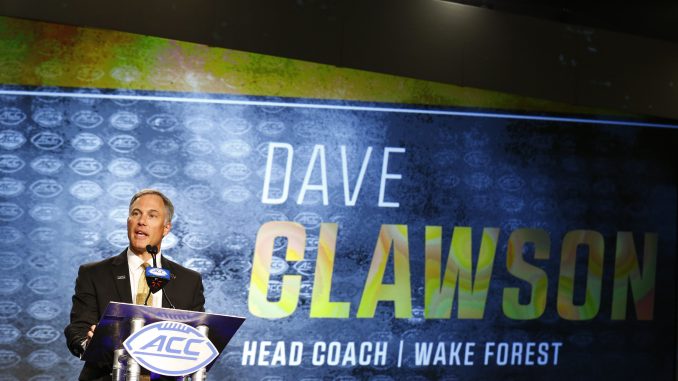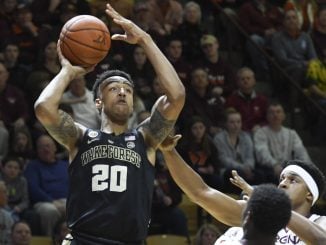
CHARLOTTE — Nike caused a stir a few years back for an advertising campaign that featured Tiger Woods and the slogan “Winning solves everything.”
While that might not actually be the case for the former world No. 1 golfer, whose career has taken a nosedive in recent years, winning sure has made life a lot better for the Wake Forest football team.
“It was huge for us, because it was a tangible result we could see,” tight end Cam Serigne said Thursday at the ACC’s Football Kickoff media event. “It showed our improvement, because it’s so hard in our league to find those tangible things to show you how much work you’ve put in. And we’ve been working on this for the past three years with kind of no result.”
The Deacons finished 7-6 last season with a win against Temple in the Military Bowl. While that success might seem modest by most college football standards, especially since the bowl victory snapped a four-game losing streak to end the regular season, it represented a giant leap forward for a program that hadn’t posted a winning record since 2008.
“We’d been 3-9, 3-9, then to finally go to that bowl game was something that gave us confidence. It was like here we go, it’s the start of a new era. For us it wasn’t like our end goal to just make a bowl game, We want to win an ACC championship and this was just a catapult to these next goals.”
Coach Dave Clawson said he can already see a difference in the attitude and work ethic his players have shown through spring practice and individual summer workouts.
As a coach who has become something of a specialist at rebuilding downtrodden programs — having already done so at Fordham, Richmond and Bowling Green — Clawson came to the Deacons in 2014 knowing exactly what to expect.
And that the turnaround wouldn’t happen overnight.
“You first start seeing the players get stronger,” he said. “Then you see them running faster 40s and then their GPAs go up and they miss less class. There just becomes an accountability in your program that carries over to Saturday on game days. They block the right rusher, they blitz the right gap, cover the right person. We’re a place that needs to do things right.”
The problem was convincing his players to keep faith in the process, even though their improvement in all those areas didn’t immediately translate into more wins.
“You can keep telling players they’re getting better, they’re making progress, but until they win games (they aren’t going to fully believe you),” Clawson said. “That’s why as you get to Year 3, it becomes really important.
“Finally getting back to a bowl, winning that game, our kids are just a much more confident group. What happens is, because of that, they want to invest even more because they feel like they’re getting positive feedback from all that work they’re putting in.”
Now instead of relying on their coaches to push them harder, the players have begun taking that responsibility into their own hands.
“It’s different this year,” defensive end Wendell Dunn said. “Everybody holds each other accountable right now. In the off-season this summer, guys are worrying about the little things, because that’s what affects the big things. Everybody’s bought in.”
As productive as that new attitude and the work that goes along with it might be, it doesn’t guarantee further success.
With a schedule that includes a road game at 10-win Appalachian State, trips to Georgia Tech and Notre Dame, along with the annual Atlantic Division gauntlet of Clemson, Florida State and Louisville — not to mention a lot of holes to fill on defense and a new defensive coordinator — the Deacons are going to have to earn whatever improvement they get.
“We’re better,” Clawson said. “But we better be better because the schedule is tougher.”



